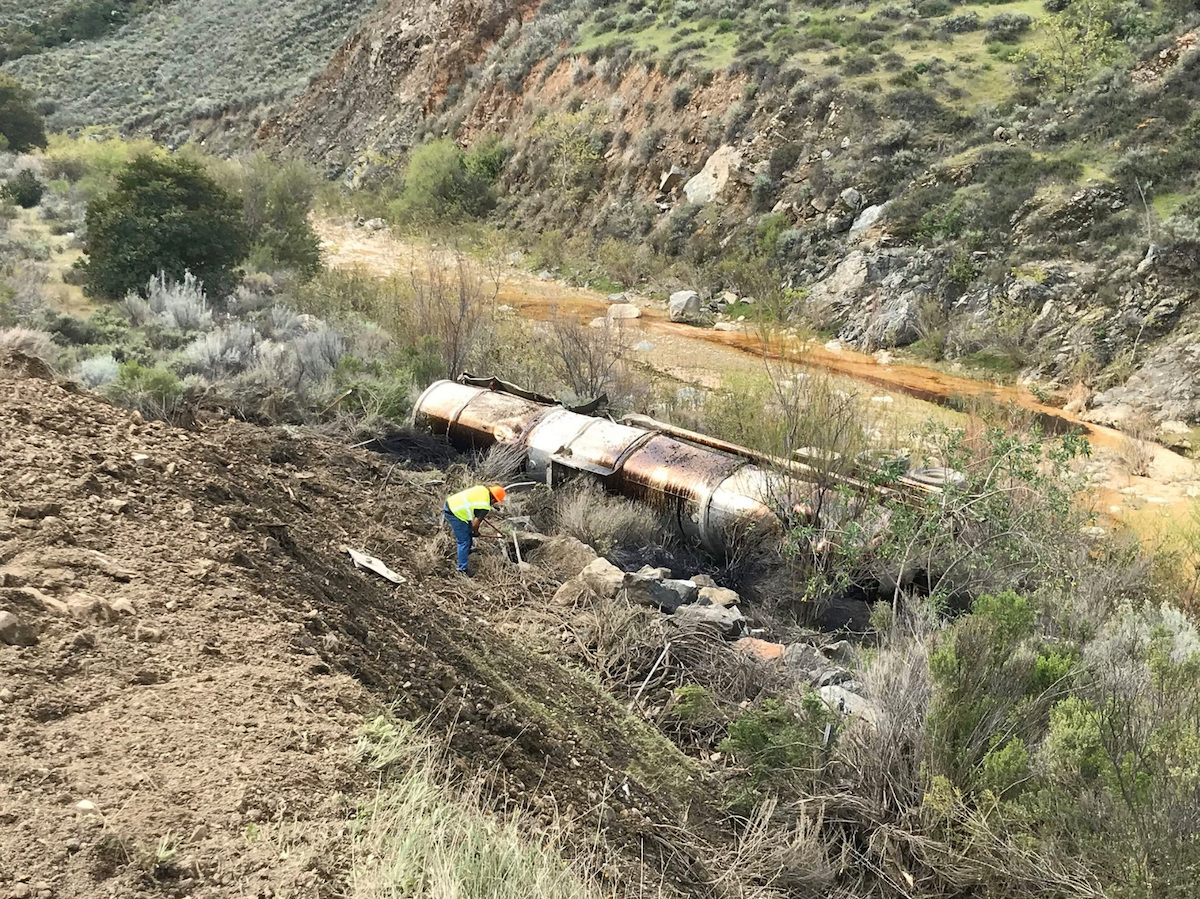Santa Barbara Prosecutors Settle Cuyama River Oil Spill Case
Santa Barbara District Attorney’s Office Finalizes Settlement with Bakersfield-based Trucking Company

In a case of seriously bad timing for ExxonMobil, the Santa Barbara District Attorney’s office just finalized a settlement with the Bakersfield-based trucking company responsible for a 4,500-gallon oil spill into the Cuyama River not far above Twitchell Reservoir nearly two years ago.
While the spill hardly qualifies as the biggest in county oil history, it might well be the most politically inopportune. Its settlement announcement comes just a few weeks before the county supervisors are scheduled to decide the fate of ExxonMobil’s proposal to send up to 78 tanker trucks a day from its plant at Las Flores Canyon to a facility in Kern County by way of Highway 166. The spill in question has been seized upon by environmental critics of the plan as Exhibit A in their argument as to why Highway 166 is not a safe route for such an undertaking.
The settlement, while relatively modest in terms of dollars and cents, calls attention to the proposal’s most evident weakness and will make it that much harder for ExxonMobil to garner the votes necessary to reopen its Gaviota plant.
Based on the settlement agreement, Golden Valley Transfer Company has agreed to pay $111,326 to the California Department of Fish and Wildlife to help restore the stretch of riverbed contaminated when an oil tanker driven by one of the company drivers — Jesse Villasana — lost control of his rig in the early morning hours of March 21, 2020, while heading into a curve while driving at what prosecutors characterize as “unsafe speed.” In addition, the company will pay a fine of $88,674. Beyond that, the company had already spent $314,320 in cleanup costs. And that doesn’t count the fine imposed last February by the Environmental Protection Agency.
As for the driver, Villasana, he’s been fined $515 for his role in the accident. He will also serve a year on probation. During that time, he must perform 20 hours of community service for an environmental organization.
Villasana was heading into a curve while going down a steep grade when the tanker of oil he was carrying as cargo flew off his rig and down the embankment, and landed in the Cuyama River. According to court papers filed by county prosecutors, Villasana was “driving at an unsafe speed and performed an unsafe turning movement, thereby causing the tank to break free from the cab.” He was doing so while driving “at night down a one-way, curved road.” Villasana’s negligence, they alleged, “imputes to” Golden Valley.
Of the 6,100 gallons of oil Villasana was hauling from Bakersfield to Santa Maria, 4,500 gallons wound up spilling into the river, which was then flowing.
At the time, county energy planners and the consultants they’d hired to analyze the ExxonMobil trucking plan were grappling with two seemingly contradictory propositions. On one hand, they’d concluded, the “risk of upset” posed by such a trucking spill could never be fully mitigated. On the other, they insisted, the actual risk of such a spill qualified as a once-in-a-blue-moon event.
Sign up for Indy Today to receive fresh news from Independent.com, in your inbox, every morning.
And then Jesse Villasana rolled his truck, sending all the consultants and energy planners scrambling back to the drawing board. Ultimately, they would conclude the likelihood of this happening again to be a once-in-a-17-year occurrence.
Of the fine, $15,000 will go to the District Attorney’s office and $25,000 to the County of Santa Barbara. The rest will go to the California Department of Fish and Wildlife.
Because the risk of upset qualifies as a “Class I” environmental impact, the supervisors would legally be required to make “findings of overriding considerations” in order to approve ExxonMobil’s trucking plan, vigorously opposed by a large coalition of environmental organizations. Such findings are almost entirely up to the discretion of the supervisors, three of whom enjoy strong support from their large and vocal environmental constituents.
The trucking proposal emerged in response to the Plains All American Pipeline company’s rupture in 2015 of two stretches of pipeline that until then had carried all of ExxonMobil’s Las Flores Canyon oil to markets and refineries elsewhere in the state. ExxonMobil has been effectively shut down since then and will be effectively shut down indefinitely without the ability to truck its oil. Although plans for a new and improved pipeline have been submitted, environmental review remains at least two years off, and after that, there will be no shortage of regulatory hurdles and negotiations with private property owners for the necessary easements.
In the meantime, the world’s largest oil company could find itself shut down indefinitely based on the threat of future spills exactly like the one that occasioned the settlement announced this week by the district attorney’s office.
Support the Santa Barbara Independent through a long-term or a single contribution.



